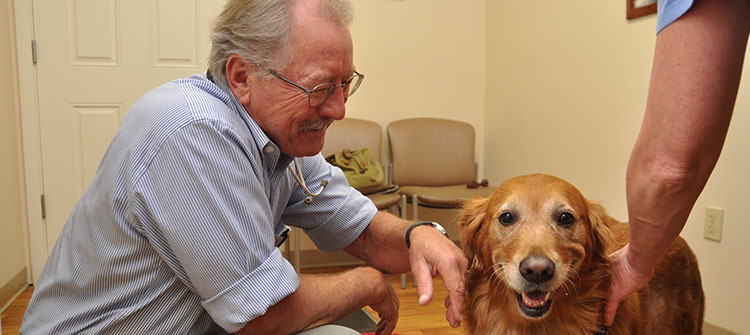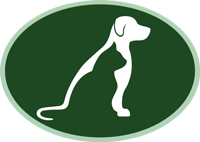Senior Dog Care
Growing Older with your Dog!
Aging pets have their own special needs; changes in their bodies result in a greater incidence of many conditions. The best way to approach these potential problems is to prevent them when possible, and catch them early when prevention is impossible. With increased vigilance, the doctors and staff at Portsmouth Veterinary Clinic can help our older animals live longer, happier, more comfortable lives. For pets over the age of 8 (earlier in larger breeds), we recommend physical exams every 6 months, even if they seem to be well. (A yearly physical for an older dog is the same as your grandmother only seeing her doctor every 7 years!) A professional exam may uncover small problems before they become big ones.

Nutrition
Foods that are formulated for young or growing dogs and cats are no longer appropriate for older pets. A senior diet is a good example of food that balances protein, phosphorous and sodium at levels more suited to older animals. Some senior diets also contain glucosamine to help maintain joint health. Weight control is especially important in this phase of your pets’ life. Maintaining a trim form will dramatically help out arthritic joints. If your pet is overweight, please ask your doctor how you may safely go about taking the excess pounds off.
Dental Care
Oral health is critical for the comfort of our pets. Be sure to examine your pets’ mouth regularly, looking for signs of gingivitis (redness and swelling of the gums), tartar buildup or a bad odor from the mouth. All of these things indicate infection in the mouth which can result in a decrease in appetite, mild depression, and pain. Periodic oral exams, ultrasonic scaling and polishing can make a huge difference in quality of life for most animals.
Internal Organ Function
There are many problems that commonly occur in some animals late in life. The heart, thyroid, kidneys, and liver may be affected. Many strides have been made in treating these various problems, but early diagnosis is crucial. To this end, we may recommend annual blood screening, fecal examinations, and urine checks. More frequent physical exams (every 6 months) will help us monitor the heart for murmurs or arrhythmias.
Joint Health
Older animals almost invariably develop arthritis as time goes on. Both dogs and cats can benefit from glucosamine, chondroitin sulfate, and omega-3 fatty acids or a combination of all three. In some animals, the joint supplements alone result in pain relief, and some animals require anti-inflammatories to be comfortable. Even if your dog or cat is taking an anti-inflammatory, a joint supplement is still recommended. Products like glucosamine help protect the joint from further erosion and maximize joint fluid. Joint supplements generally take between 12-16 weeks to begin to be effective. We also recommend providing comfortable bedding to give the aging joints a soft place to rest.
Lumps and Bumps
Semi-annual examinations will allow us to more closely monitor those lumps that crop up in again pets. The majority are harmless masses, but roughly 20% will require treatment.
Grooming
Dogs will be more comfortable when they are clean and well brushed.
What to Look for at Home
Because dogs and cats age more rapidly than people, dramatic changes in health can occur in as little as 3 to 6 months. If you notice any of the following signs, we recommend you schedule an appointment to have your dog evaluated:
- Weight loss
- Decrease in appetite
- Bad breath or drooling
- Increased appetite, especially if accompanied by weight loss
- Excess urination
- Increased water intake
- Reduced exercise, increased stiffness, trouble jumping or walking
- Apparent pain when your dog moves or is handled
- Any vomiting, abnormal stool or decreased frequency of bowel movements
- A new lump or growth, especially if it appears to increase in size quickly
- Appearance of a “pot belly”
- Depression or listless behavior
- Excessive panting
- Heavy or rapid breathing when resting
- Coughing

